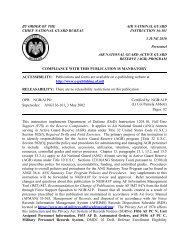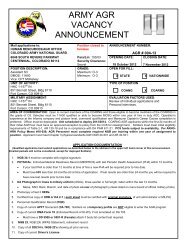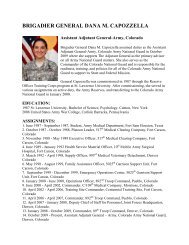Prosecuting Alcohol-Facilitated Sexual Assault - National District ...
Prosecuting Alcohol-Facilitated Sexual Assault - National District ...
Prosecuting Alcohol-Facilitated Sexual Assault - National District ...
Create successful ePaper yourself
Turn your PDF publications into a flip-book with our unique Google optimized e-Paper software.
P R OSECUTING A LCOHOL-FACILITATED S EXUAL A SSAULT<br />
Mary P. Koss, <strong>Alcohol</strong> and <strong>Sexual</strong> <strong>Assault</strong> in a <strong>National</strong> Sample of College Women, 14(6) J.<br />
INTERPERSONAL VIOLENCE 621 (June 1999).<br />
19 Garriott, supra note 8, at 77.<br />
20 Garriott, supra note 8, at 83. Eighty-two percent of people twelve and older have used alcohol<br />
at least once in their lifetimes and nearly half of all Americans twelve and older (approximately<br />
109 million people) have used alcohol during the past month. NATIONAL CLEARINGHOUSE FOR<br />
ALCOHOL & DRUG INFORMATION, SUBSTANCE ABUSE AND MENTAL HEALTH SERVICES<br />
ADMINISTRATION, U.S. DEP’T OFHEALTH AND HUMAN SERVICES 2(1) SUBSTANCE ABUSE IN BRIEF<br />
(April 2003).<br />
21 The process for filing charges varies by jurisdiction. In some jurisdictions, the police file<br />
charges, while in other jurisdictions, the prosecutor has the power to file charges. This section is<br />
written as though the prosecutor is the decision maker in the charging process; however, the<br />
analysis remains the same regardless of whether the prosecutor, the police officer, or a combination<br />
of the two make the decision.<br />
22 Probable cause is the ethical standard attorneys must follow with respect to charging decisions.<br />
See, e.g., Rule 3.8(a), Model Rules of Professional Conduct. “The prosecutor in a criminal case<br />
shall refrain from prosecuting a charge that the prosecutor knows is not supported by probable<br />
cause.”<br />
23 Please see state specific law as each state has its own charges. These three theories were determined<br />
by surveying the nation’s rape statutes.<br />
24 This type of rape may fall under the definition of “physically helpless.”<br />
25 Note that there are additional types of rape; however, this monograph focuses on sexual assault<br />
of the voluntarily intoxicated victim.<br />
26 Patricia A. Falk, Rape by Drugs: A Statutory Overview and Proposals for Reform, 44 ARIZ. L.<br />
REV. 131, 137 (2002).<br />
27 The term “real rape” was originally defined by Susan Estrich as the stereotype of an assault<br />
committed by an armed stranger with a great deal of force. SUSAN ESTRICH, REAL RAPE (1988).<br />
28 Ilene Seidman & Susan Vickers, Beyond Prosecution: <strong>Sexual</strong> <strong>Assault</strong> Victim’s Rights in Theory<br />
and Practice Symposium: The Second Wave: An Agenda for the Next Thirty Years of Rape Law<br />
Reform, 38 SUFFOLK U. L. REV. 467, 485-86 (2005).<br />
29 MCCORMICK ON EVIDENCE 342 (Kenneth S. Broun et al. eds., 6th ed. 2006).<br />
30 Id.<br />
31 Id.<br />
32 Note that some states have statutes making it a crime to have intercourse with a person who is<br />
mentally defective but it is unlikely that a person will fall into this category due to intoxication.<br />
33 See, e.g., Arizona: A.R.S. §§ 13-1401 and 13-1406; Illinois: 720 Ill. Comp. Stat. 5/12-13;<br />
Kansas: K.S.A. § 21-3502; Maine: 17-A M.R.S. § 109; Missouri: R.S.Mo. §§ 566.040 and<br />
566.061; and Wisconsin: Wis. Stat. § 940.225.<br />
34 See, e.g., Arkansas: A.C.A. §§ 5-14-101 and 5-14-103; Colorado: C.R.S. § 18-3-40; Illinois: 20 IL<br />
Comp. Stat. § 51/12-13; Iowa: Iowa Code 709.1l; Montana: M.C.A. §§ 45-2-101 and 45-5-502;<br />
Nebraska: R.R.S. Neb. § 28-319; Nevada: N.R.S. 200.366; New Mexico: NM Stat. § 30-9-10;<br />
New York: NY CLS Penal § 130.05; South Dakota: S.D. Codified Laws § 22-22-7.2; Virginia: VA<br />
Code §§ 18.2-61 and 18.2-67.10; Washington: ARCW § 9A.44.060. Note that a number of states<br />
require that the substance be administered to the person without the person’s consent in order to<br />
find that the person was mentally incapacitated. See, e.g., Arkansas: A.C.A. §§ 5-14-101 and 5-14-<br />
103; Hawaii: HRS § 707-731; Kentucky: K.R.S. § 510.050; Maryland: Md. Criminal Law Code<br />
Ann. §§ 3-301 and 3-304; Minnesota: Minn. Stat. §§ 609.341 and 609.342<br />
35 See, e.g., Alabama: Code of Ala. §§ 13A-6-60 and 13A-6-61; Arkansas: A.C.A. §§ 5-14-101<br />
and 5-14-103; Colorado: C.R.S. §§ 18-3-401 and 18-3-402; Connecticut: Conn. Gen. Stat. 53a-<br />
44 N ATIONAL D ISTRICT ATTORNEYS A SSOCIATION
















